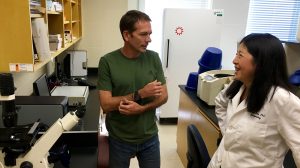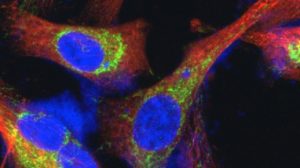Two University of Mississippi researchers working to find new drugs to stop the spread of breast cancer to other organs have received a major award from the National Institutes of Health to continue their studies for three years.

Mika Jekabsons (left) and Yu-Dong Zhou (right) discuss their breast cancer research in one of the laboratories.
Yu-Dong Zhou, of the Department of Chemistry and Biochemistry; and Mika Jekabsons, associate professor of biology; are co-principal investigators for “Antimetastatic Drug Discovery that Targets Metabolic Plasticity.” The new National Institutes of Health/National Cancer Institute grant for $426,720 began July 15 and runs through June 30, 2019.
“Over 90 percent of cancer mortality is directly associated with invasion of cancer cells into vital organs,” Zhou said. “No treatment option effectively prevents metastatic progression.”
According to the American Cancer Society, the five-year survival rate for the 162,000 American women with metastatic breast cancer is only 23 percent. The long-term objective of the duo’s research is to discover and develop new drugs – or find new uses of existing drugs – that curb the metastatic spread of breast cancer.
“Surgical removal of tumors within vital organs is often not possible, which leaves molecular-based therapeutics as the only alternative treatment,” Jekabsons said.
To tie in with this project, this research will continue to provide valuable opportunities for training in the biomedical sciences. Zhou and Dale Nagle, professor of biomolecular sciences, have taken on almost a dozen Sally McDonnell Barksdale Honors College students, all majoring in biology, biochemistry or pre-pharmacy, with the aim of training them in laboratory-based anticancer research and natural product drug discovery.
“I am only an enthusiastic collaborator,” Nagle said. “Under the leadership of Drs. Zhou and Jekabsons, these brilliant and inquisitive minds are making vital contributions to research that looks to eradicate the spread of breast cancer.
“This is certainly an experience that will advance their future careers and that they will be proud of years from now.”
Breast cancers can spread to multiple vital organs such as the lungs, bones, brain and liver. Genetic studies of breast cancer cells that have invaded other organs led to the identification of candidate genes that may predict their potential to invade other tissues.
“We have treated invasive breast cancer cells growing in culture dishes with diverse chemical compounds obtained from natural products as a means of searching for potential drug leads that could stop their growth,” Zhou said. “Our preliminary data support this hypothesis by demonstrating that compounds which disrupt tumor metabolism specifically suppress the growth of breast cancer cells that had previously invaded select vital organs.”
Jekabsons added, “This research validates and expands our initial efforts using FDA-approved oncology drugs by demonstrating that diverse novel chemicals from plants and other natural products may prevent the growth of selective subtypes of breast cancer cells that have invaded specific organs.”
The study was prompted by the finding that some chemicals, which disrupt cellular energy production, prevent the growth of selective subtypes of breast cancers that previously invaded other organs. The Ole Miss researchers are working to evaluate the metabolic profiles of the different subtypes and determine how different natural product chemicals may interfere with specific metabolic pathways.
“Based on our observations, we propose a potentially targetable ‘metabolic plasticity’ model for organ-selective metastasis,” Zhou said. “Specifically, cancers that invade other organs are metabolically adaptable and assume metabolic characteristics that are most suitable for growth in the target organs they invade.”
This project brings together Zhou’s expertise in cancer research and Jekabsons’ in a tumor cell’s energy production to identify promising leads that target the spread of malignant breast cancer cells, especially those that suppress tumor cell “food intake” in those vital organs invaded by them.
“Our ultimate goal is to find an effective approach that can improve the prognosis of patients affected by metastatic disease,” Zhou said. “Such an interdisciplinary research is only possible when people in different fields of science work together towards a common goal in a highly supportive environment.”
Zhou and Jekabsons have been collaborating for a decade. Nagle and Ikhlas Khan, new director of UM National Center for Natural Products Research in the School of Pharmacy, plan to continue their collaboration with Zhou and Jekabsons on this project.
“We are all extremely grateful to both Drs. Charles Hussey and Alice M. Clark for actively making Dr. Zhou’s transition from the School of Pharmacy to the Department of Chemistry and Biochemistry possible,” Nagle said.
In line with Academic Research Enhancement Award program objectives, this project will strengthen the UM natural products and metabolism research environment and give students hands-on experience in antitumor drug discovery and tumor bioenergetics research.
The project is funded through NIH grant No. 1R15CA199016-01A1. Original post: https://news.olemiss.edu/um-professors-receive-nih-grant-breast-cancer-research
